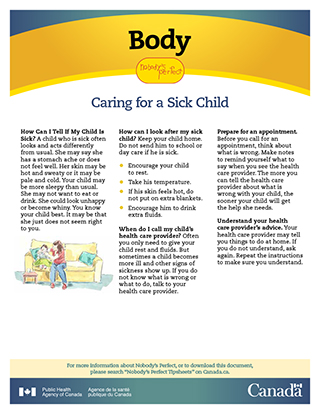Body: Caring for a Sick Child
How Can I Tell If My Child Is Sick? A child who is sick often looks and acts differently from usual. She may say she has a stomach ache or does not feel well. Her skin may be hot and sweaty or it may be pale and cold. Your child may be more sleepy than usual. She may not want to eat or drink. She could look unhappy or become whiny. You know your child best. It may be that she just does not seem right to you.
How can I look after my sick child? Keep your child home. Do not send him to school or day care if he is sick.
- Encourage your child to rest.
- Take his temperature.
- If his skin feels hot, do not put on extra blankets.
- Encourage him to drink extra fluids.
When do I call my child's health care provider? Often you only need to give your child rest and fluids. But sometimes a child becomes more ill and other signs of sickness show up. If you do not know what is wrong or what to do, talk to your health care provider.
Prepare for an appointment. Before you call for an appointment, think about what is wrong. Make notes to remind yourself what to say when you see the health care provider. The more you can tell the health care provider about what is wrong with your child, the sooner your child will get the help she needs.
Understand your health care provider's advice. Your health care provider may tell you things to do at home. If you do not understand, ask again. Repeat the instructions to make sure you understand.
Giving Medicine
When Should I Give Medicine? Do not give medicine to a baby or child without checking with a health care provider or pharmacist. Giving the wrong medicine or the wrong amount can do more harm than good.
If your health care provider prescribes medicine for your child, there are things you need to know.
- What is the medicine called?
- What is it supposed to do?
- How much should you give your child?
- How often should you give it to your child?
- Should you keep giving it until it is all gone?
- Should you give the medicine with food or on an empty stomach?
- Should your child avoid certain foods while he is taking the medicine?
- Will the medicine interfere with any other medicine your child may be taking?
- Should you wake your child up during the night to give him the medicine?
Stop giving medicine if your child has a reaction. A reaction to medicine could be something like a red rash or vomiting. Call your health care provider right away.
Give your child's medicine only to your child. Give the medicine exactly as prescribed. Do not give your child's medicine to other children. Do not give someone else's medicine to your child. A prescription is given for a particular child with a particular illness. If any medicine is left over after your child's illness, take it back to the pharmacist.
Key Message
Keep all medicines locked up and out of reach of children.

Download the alternative format
(PDF format, 1.1 MB, 2 page)
Organization: Public Health Agency of Canada
Program providers: Please use this space to input your organization's information.